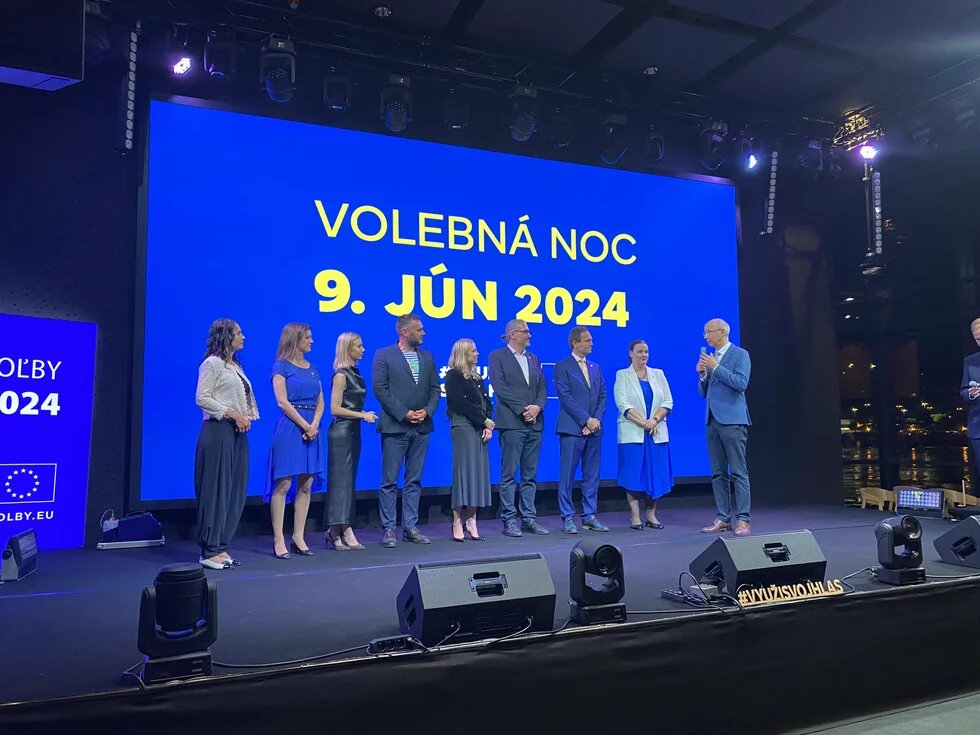For the Hlas party, whose candidates won big in elections to the national legislature and the presidency in Slovakia, harsh anti-EU rhetoric and disinformation was a new tactic in the elections to the EP – the wrong one, as it turned out.

The main story from Slovakia’s elections for the 2024 European Parliament was the clear win of the opposition Progressive Slovakia party. Finally, their slogan “They Can’t Have Everything!”, targeting the nationalistic, populist Smer party in the current governing coalition, has come true. It was also not surprising that Smer MEPs, including professional disinformation and hate speech spewers, came in second this time.
What is more interesting is the story of the Hlas party, also in the current coalition government. The former political home of Slovak President Peter Pellegrini was a kingmaker during the crucial 2023 election in which Robert Fico (Smer) became Prime Minister for the fourth time.
Once seen as a modern social democratic party, the coalition agreement with the far-right Slovak National Party meant that Hlas had to say goodbye to its dreams of joining the Social Democratic group in Brussels. Free of that association, the party went all in on an anti-EU disinformation campaign during the elections to the EP.
EU will take your car. Check. Migrants on boats? Check. Brussels will demolish your grandma’s house? The Hlas campaign had it all.
Moderates shifting to radical, populist disinformation in an election campaign is not news in 2024. What is interesting is the fact that this tactic failed in Slovakia. Hlas won just one seat in the election, and not for its radical number one candidate, but for the demure number two with a much quieter social media presence.
Disinformation in Slovakia’s campaign
According to the analysis of pre-election social media campaigns in Slovakia published on Euractiv.sk, it was Branislav Becík, the lead candidate for Hlas, whose disinformation posts were the most successful online. Becík shared videos claiming that Brussels is threatening to kill Slovak cows, favours “contaminated” Ukrainian grain, and will not shy away from demolishing grannies’ houses, all in the name of its environmental ambitions, which Becík promised to fight. The candidate spent thousands of euros on Facebook ads and reached more than 125,000 Slovaks.
But the campaign did not work. Hlas won just 7.18% of the vote in the European Parliament election, less than half of the 14.7% it had won just a few months before, in the elections to the national legislature. Their single seat went to Branislav Ondruš, who ran from second place and overtook Becík with a campaign that was much less forward on social media.
Overall, Hlas won fourth place in the election, losing to the Progressives, Smer and the far-right party Republika. The Smer and Republika parties and their politicians were among the top ten EU communicators on social media and had spread anti-EU disinformation even before the campaign.
The story of Hlas shows that there is a point of market saturation for disinformation. Smer and Republika had dominated the circles of disinformation on social media for a while. Dipping their toes in at the last minute did not work for Hlas.
Ultimately, the election victory of Progressive Slovakia, whose campaign avoided misleading statements and even promised to fight hate speech and disinformation, proves that what works in one election might not translate in another. The EU-positive camp won the EP elections in Slovakia for the second time in a row, and this time, Slovakia’s election turnout was not the lowest in the EU.
What’s next for Slovakia
One interesting consequence of the election is that Progressive Slovakia will have one of the largest national delegations in its EP group, Renew Europe. They might be the only party from Slovakia with real influence at the EP.
Smer and Hlas made no real progress towards their stated goal of rejoining the Social Democrats, which is unsurprising given that their rhetoric more closely follows the new Patriots for Europe group in the EP. Smer’s leading MEP, Monika Beňová, has alluded to the possibility of entering that group.
Meanwhile, the two MEPs from the far-right Republika party have found a new home alongside the far-right German AfD in the most recently announced group, the Europe of Sovereign Nations.
Trailing right behind Hlas in Slovakia were the Christian Democrats, whose single EPP seat will probably do little to influence that group to turn away from supporting LGBTI+ rights.
However, the fact that liberals are the only clear winners of the EP elections in Slovakia means little to domestic politics. Smer’s electorate remains supportive of the party even as it passes legislation threatening the rule of law and media freedom. That’s all the more reason for the newly-formed European Commission to make use of its rule-of-law arsenal.


